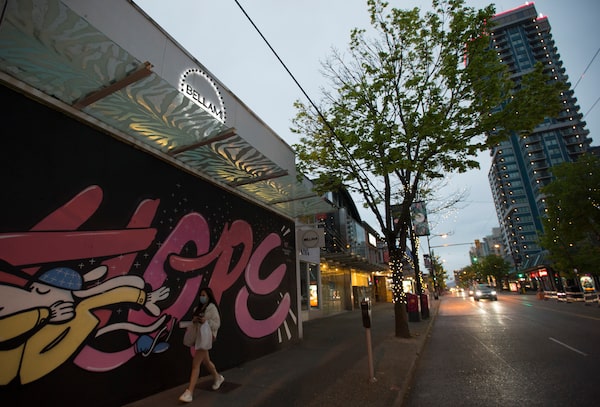
A woman wearing a protective face mask walks past the boarded up shops along Robson Street in downtown Vancouver, May 4, 2020.JONATHAN HAYWARD/The Canadian Press
B.C. Premier John Horgan will outline plans to reopen the provincial economy on Wednesday in what his government hopes is the end of the beginning of the pandemic.
His minority government has held power, against the odds, since the summer of 2017, with an agenda that focused on climate action, Indigenous reconciliation and social justice. On Wednesday he will have to pivot to an agenda designed to rebuild an economy being hammered by a domestic lockdown and a looming global recession.
In February, just as the very first cases of COVID-19 were being detected in British Columbia, the B.C. government delivered a Throne Speech that celebrated its efforts to increase affordable housing, open new child-care spaces and improve public transit.
In March, the government declared a state of emergency and 132,000 jobs were lost because businesses were shuttered by government or physical distancing measures encouraged British Columbians to stay home.
The Business Council of B.C. forecasts the province’s economy will contract by somewhere between 7 and 12 per cent this year. The best-case scenario envisions that most businesses resume operations by the fall. In the worst-case scenario, the pandemic surges again in the fall, leading to another round of restrictions and closings. In any event, more job losses are yet to come: B.C. could lose between 180,000 and 300,000 jobs this year.
Still, British Columbia did not shut down the economy to the same extent as Quebec, Alberta and Ontario. Many B.C. businesses were declared essential, and major sectors including manufacturing and construction have continued with physical distancing measures in place. This week, the government declared that the spread of COVID-19 has been contained enough to allow for an easing of its restrictions.
Mr. Horgan’s government has set aside a $1.5-billion recovery fund, and will now have to make a choice: Will that money be spent trying to repair the economy that was, or will the government seek to lay a different foundation?
Economist Jock Finlayson, chief policy officer at the Business Council of B.C., said the recovery will require the government to find a new focus.
“Digging out from the huge crater our economy and job market have fallen into will be a Herculean challenge for the next couple of years. Among other things, it will require a different approach to priority-setting by the Horgan government," he said.
Mr. Finlayson said B.C.'s New Democratic Party government has taken the economy and the job market for granted, while putting its energy into files such as affordability, climate change and reconciliation. “That will have to change now, as we slowly and hesitantly emerge from the worst economic slump in modern times.”
However, Mr. Horgan’s minority government rests on the support of the B.C. Green Party caucus. Interim Green leader Adam Olsen said the government cannot put reconciliation or climate action on the back burner. “I don’t see a world in which you can set those aside,” he said.
Rather, Mr. Olsen said, the pandemic has created an opportunity to rebuild a better province based on the province’s existing climate action plan, called Clean BC.
“We’ll be judged on the decisions that are made in the next couple of months,” he said. “Clean BC outlines a needed transition in our economy. I think it would be wrong to take a step back.”
Merran Smith, executive director at environmental think tank Clean Energy Canada, agreed. “Our climate action plan is a great blueprint for shovel-worthy projects,” she said. She expects the government to use some of its pandemic recovery fund to expand Clean BC programs.
“Whether its electrifying more in our cities so that there’s less pollution or getting people back to work by accelerating housing retrofits, or building more social and affordable housing that’s energy efficient – these are all great opportunities for us to build a better-than-normal economy.”
Laird Cronk, president of the BC Federation of Labour, said the government does not need to move away from its pre-COVID-19 agenda to rebuild the economy.
“There’s an opportunity through all the difficult times for a reset of what we want this province to look like," he said.
Most of the job losses have been in the private sector and he said it is expected that money will flow to help rebuild those businesses.
“But it’s also an opportunity for government to play a significant role in putting people back to work and using government stimulus to restart the economy, consistent with their values and goals.”
 Justine Hunter
Justine Hunter